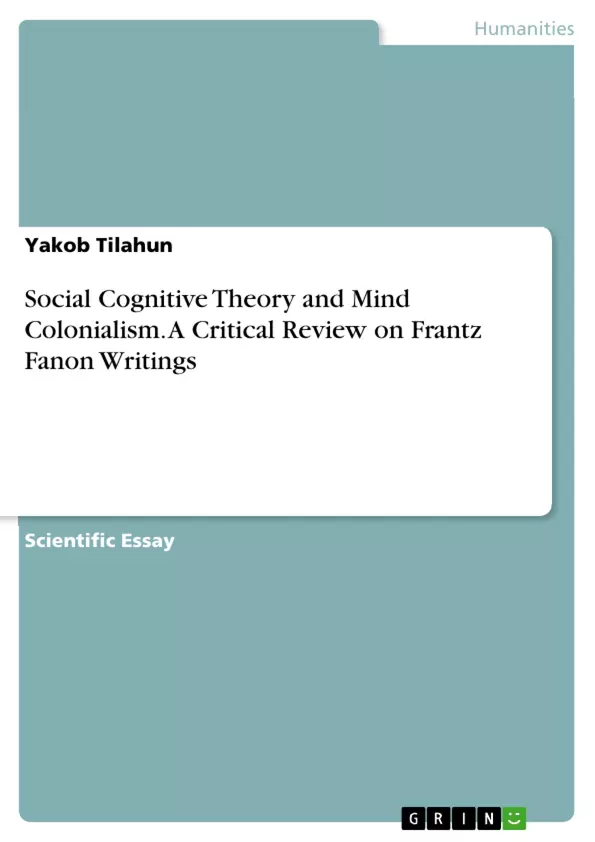Psychological theories are basically the reflection of the brain and mind interactions with human beings and the role of environment on the activation of individual behaviors and group influence. For such explanations, there are many perspectives by which the foundation of knowledge in the behavioral studies is developed into a full-scale theory. Social cognitive theory is also a product of such methodological concerns in which the formation of its essence contributes to the fundamental characteristics of human cognition in relation to its relevance to bring about a behavioral change and human development in terms of the human tendency to interpret the psychological world and learned through different mechanisms. On the other hand, Frantz Fanon was one of the most recognized black scholars in the 20th century. His prominent effect on the psychiatric, oppression psychology, colonialization and the need to use psycho - political tactics for the resistance /liberation movements of the colonized can be mentioned. In his rigorous effort to study and publish critical books and articles that concern human freedom and mind decolonization, he attracted scholars of the pre- and post-colonial era and different multi-disciplinary discourses. The fundamental point in his demonstrative of conceptualizing and renovating the power of consciousness to the act of freedom and human, concerns to the theorizing of mind, culture and their interrelation, come across the change that ultimately brings about liberation and self-reliance. Thus, it is easily understood that the thought of Frantz Fanon is relevant into the current postmodern world because it falls back into his analysis to the emergence, formation, and persistence of mind conditioning from previous colonial powers. Furthermore, both individuals and societies share this principally an explanation of the psychological acquisition of stimulus vs response attachment and other classifications of the learning process as a way to live by the rules of life in the long run.
Keywords: Mind Colonialism, Social Cognitive Theory, Social Learning Theory, Frantz Fanon, Albert Bandura
Inhaltsverzeichnis (Table of Contents)
- Background of the paper
- Objective of the Paper
- The general Objective of the Paper
- Specific Objectives of the Paper
- Objective of the Paper
- Method
- Introducing Frantz Fanon's Insights In relation to Social Psychology
- The Essence of Social Cognitive Theory and Its Influence in Mind Colonialism
- Synthesizing Fanon's Contribution on Mind colonialism with Social Cognitive Theory
- Conclusion
- References
Zielsetzung und Themenschwerpunkte (Objectives and Key Themes)
The purpose of this paper is to examine Frantz Fanon's writings on mind colonialism in light of the principles of social cognitive theory. The paper aims to explore the social psychological elements of Fanon's work, explain the concept of mind colonialism within the framework of social cognitive theory, and synthesize Fanon's contributions on mind colonialism with the insights of social cognitive theory.
- Social Cognitive Theory and its application to mind colonialism
- Frantz Fanon's writings on mind colonialism
- The impact of colonialism on individual and collective identity
- The role of social learning in shaping attitudes and beliefs
- The potential for resistance and decolonization
Zusammenfassung der Kapitel (Chapter Summaries)
- Background of the paper: This chapter introduces the concept of mind colonialism and its relevance to the study of social psychology. It highlights the importance of understanding the relationship between cognition, behavior, and the environment in the context of colonialism and its lasting effects.
- Method: This chapter outlines the research methods employed in the paper.
- Introducing Frantz Fanon's Insights In relation to Social Psychology: This chapter explores Fanon's work on colonialism, highlighting his key insights into the psychological impact of colonization.
- The Essence of Social Cognitive Theory and Its Influence in Mind Colonialism: This chapter delves into the core principles of social cognitive theory, explaining how it can be applied to understand the process of mind colonialism.
- Synthesizing Fanon's Contribution on Mind colonialism with Social Cognitive Theory: This chapter examines the intersection of Fanon's ideas on mind colonialism with the key principles of social cognitive theory, highlighting the theoretical and practical implications of this intersection.
Schlüsselwörter (Keywords)
Mind colonialism, social cognitive theory, Frantz Fanon, oppression psychology, decolonization, identity formation, social learning, resistance, post-colonialism, globalization.
Frequently Asked Questions
What is the central focus of the paper regarding Frantz Fanon?
The paper examines Frantz Fanon's writings on "mind colonialism" through the lens of social cognitive theory.
How does the paper define "mind colonialism"?
Mind colonialism refers to the emergence, formation, and persistence of psychological conditioning imposed by previous colonial powers on the colonized.
What role does Social Cognitive Theory play in this analysis?
It provides a framework to explain how human cognition, social learning, and environment interact to create or resist behavioral patterns related to oppression.
Why are Frantz Fanon's insights still relevant today?
His work on liberation, self-reliance, and the decolonization of the mind remains applicable to the postmodern world and ongoing struggles for freedom.
Who is Albert Bandura in the context of this paper?
Albert Bandura is the primary theorist behind Social Cognitive Theory, which the paper uses to synthesize and explain Fanon's psychological observations.
- Citar trabajo
- Yakob Tilahun (Autor), 2017, Social Cognitive Theory and Mind Colonialism. A Critical Review on Frantz Fanon Writings, Múnich, GRIN Verlag, https://www.grin.com/document/471237



